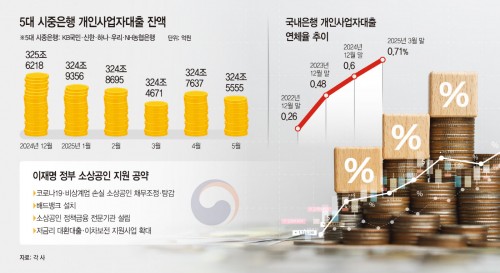 |
The Lee Jae-myung administration is accelerating its inclusive finance agenda, focusing on support for small business owners. However, South Korea’s banking sector has begun to push back, voicing concerns over the potential financial burden of government-led debt forgiveness and expanded financing.
The administration's policy direction includes securing stable financing for small businesses, restructuring debt, and forgiving certain long-term delinquencies. One key initiative is the creation of a “bad bank” to acquire and manage non-performing small loans, with the government absorbing losses from those transactions.
The envisioned bad bank would cover small business owners whose revenue has sharply declined or whose businesses have closed. In addition to debt write-offs, the government plans to implement low-interest refinancing programs, interest subsidies, and establish a dedicated policy finance agency to ensure long-term support.
Amid these developments, major banks have begun scaling back lending to sole proprietors. As of late May, the outstanding balance of loans to individual business owners at the five major banks—KB Kookmin, Shinhan, Hana, Woori, and NH Nonghyup—had declined by over 1 trillion won since the end of last year, down to 324.56 trillion won.
Delinquency rates on these loans are also climbing. As of March, the delinquency rate on small business loans reached 0.71%, the highest level in more than a decade.
President Lee has emphasized the social responsibility of financial institutions, particularly those that posted record profits during the economic downturn. This rhetoric, along with potential regulatory pressure, has raised concerns within the industry that banks may be pushed to expand risk-bearing activities they had previously reduced.
The administration’s proposal to co-finance the bad bank using both government and private sector funds is further fueling tension. With 50 trillion won worth of COVID-era loans maturing in September, banks fear potential losses—especially given President Lee’s past comments in favor of widespread debt relief.
One bank official warned, “The greater the scale of private funding, the heavier the financial burden becomes. Since banks will be using their own capital, close consultations with financial authorities are absolutely necessary.”
Experts argue that the state should bear the main cost of such initiatives. Professor Lee Min-hwan of Inha University’s Graduate School of Business noted, “Debt relief is necessary, but transferring that burden to private institutions is inappropriate. We should build mechanisms where public funds are used to support the vulnerable, rather than making banks shoulder it by obligation.”
Most Read
-
1
-
2
-
3
-
4
-
5
-
6
-
7





















